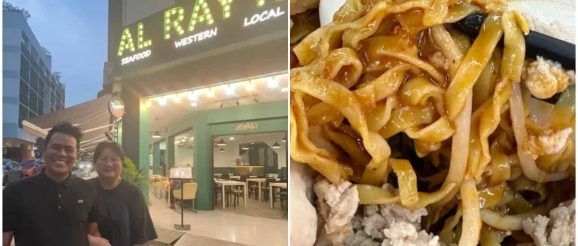Denise Deanna and Asri: Nurturing Tradition and Flavorful Innovation At Deanna’s Kitchen

Food is a powerful connector, bridging cultures, memories, and experiences. For Denise Deanna and Asri, their journey in the culinary world is a testament to the fusion of tradition and innovation, creating a unique blend of flavours that has touched the hearts and taste buds of many. As Denise aptly puts it, “If God closed a door, he opens a window,” showcasing the resilience and determination that have characterised their path.From the comforting embrace of Denise’s childhood dish to establishing a successful hawker business that champions authenticity and resilience, this is the story of Deanna’s Kitchen.
A Grandmother’s Legacy
The story begins with Denise’s grandmother’s love-infused cooking. She fondly recalls, “One of the key ingredients of the broth is pork,” describing the twice-weekly ritual of savouring her grandma’s comforting prawn mee. This broth-based dish, rich with heritage and memories, was a cherished tradition that transcended generations. However, when Denise embraced Islam, her dietary choices evolved, and she could no longer indulge in her beloved grandmother’s prawn mee. This left a void, propelling Denise on a culinary journey to recreate and share her cherished dish!
Filling the Culinary Void
Before perfecting her prawn mee, Denise struggled to find anything that matched her cherished memories. Denise candidly admits, “I realised that I was missing an important dish in my life.” This propelled her to embarkon a mission to replicate the dish, infusing it with her own creativity and the authentic flavours of her grandma’s version. She then attempted to recreate the dish for Asri’s family, introducing them to the flavours of Chinese cuisine and igniting a passion for culinary experimentation.
From Home Kitchen to Hawker Stall
Denise’s quest led to the birth of a home-based business from the couple’s residence in Toa Payoh. For almost a year, they honed their craft and gradually built a customer base. With backgrounds in banking, both Denise and Asri realised that expanding their venture required a more significant leap. The thought of opening a shop was born out of necessity and ambition. Asri advises, “Start as a hawker business as it’s more flexible, and the rental is lower.”
The Turning Point
The turning point arrived unexpectedly one day when Denise stumbled upon an empty hawker stall near her home. This serendipitous discovery ignited the idea of establishing a physical presence for their prawn mee venture. After a competitive bidding process, they secured the stall, beginning their journey into the bustling world of hawker cuisine. Denise recounts, “For the first stall, Asri quit his job at the bank and took over the stall using the recipe given.”
Challenges and Triumphs
The transition from a home kitchen to a hawker stall was far from seamless. With Denise being the sole custodian of the recipe, the early months were a struggle. Come rain or shine, she woke up early to prepare the dish and share its flavours with eager patrons. Asri’s weight loss journey from the demanding work conditions highlighted the physical toll the endeavour took on them. However, their determination, coupled with the eventual sharing of cooking skills, truly paid off.
Overcoming Taste Barriers
Denise and Asri’s prawn mee not only had to bridge cultural divides but also to win the vote of confidence from Chinese patrons, a task initially perceived as challenging. As Denise candidly acknowledges, “Initially, the worry wasn’t about getting Malays to try, but to get the vote of confidence from the Chinese about the dish and how authentic the taste is.” Their dedication and the authenticity of their dish gradually garnered acceptance from both Muslim and non-Muslim communities today!
Navigating Through Adversity
The COVID-19 pandemic presented unforeseen challenges, with closures and operational restrictions impacting their business. To weather the storm, Denise found an alternative income stream by becoming a Thermomix advisor. This strategic pivot not only helped them navigate financial hurdles but also diversified their skills. Denise reflects, “During COVID, it hit our business pretty badly… but I found a side hustle with Thermomix.”
Lessons and Resilience
Denise and Asri’s advice to aspiring entrepreneurs emphasises the importance of starting small and staying patient. The notion that an F&B business is a marathon, not a sprint, rings true. Maintaining quality, expanding the menu, and adapting to changing circumstances are constant challenges. As Denise sagely suggests, “Be honest in whatever you do (amanah).” Their story highlights the significance of resilience, faith (tawakal), and integrity (amanah) in overcoming obstacles.
Denise and Asri’s story is one of preserving tradition, infusing innovation, and forging a path of culinary success. From a beloved grandmother’s recipe to a hawker stall that brings people together, their journey exemplifies the power of food in transcending boundaries and creating lasting memories. Through challenges and triumphs, they have demonstrated that even when doors close, windows of opportunity remain open for those with the courage to pursue their passions.
